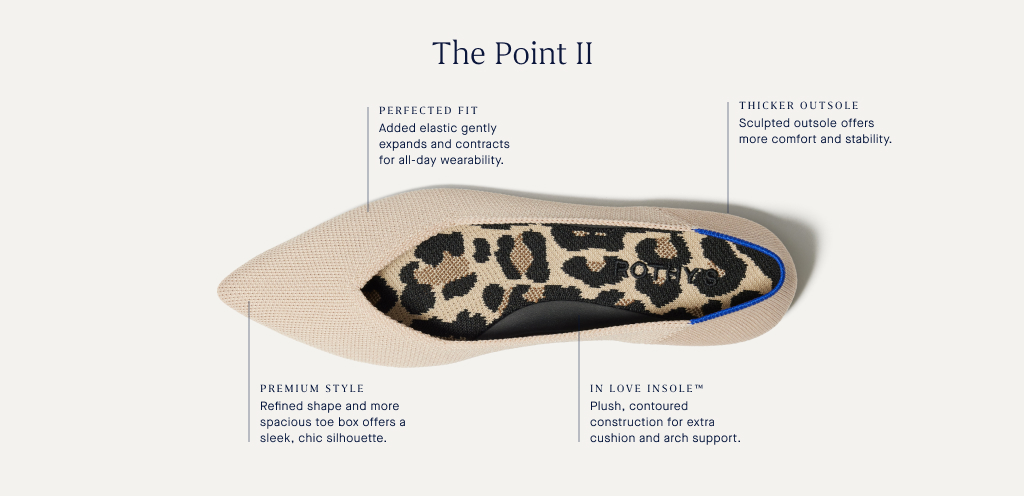Why Rothy’s is reintroducing its viral hit shoe

Rothy’s launched in 2016, back when DTC brands could still rely on Facebook ads as a cornerstone of customer acquisition strategies. Its knit flat, The Point, quickly became a cult favorite, with ads showing how the shoe could be tossed into the wash without losing its shape.
But this week, Rothy’s rolled out an updated design dubbed The Point 2.0. After selling more than two million units of The Point and launching into other types of footwear, Rothy’s wanted to update the fit and feel of its flagship shoe.
“It was time to go deep on what customers loved about the original, and what customers were looking for in the next phase,” said CMO Jamie Gersch.
A privately held company founded as a way to make shoes from single-use plastic, Rothy’s has grown from a Bay-area based women’s shoe brand to a footwear and accessories brand valued at $1 billion. It launched into bags in 2020 and men’s shoes in 2021, as well as offering different models like sneakers.
But in reintroducing this best seller, the brand had to be careful not to take away any of the features that made the shoe so popular in the first place. Apparel and accessories brands in the past have revamped items only to have some customers crave the original. Lululemon, for example, has reintroduced products like its leggings and tanks to mixed reviews. In other cases, updates aim to stay on trends, like how Abercrombie and Fitch in 2017 relaunched its denim line without pocket stitching and more stretch.
For Rothy’s, the update doesn’t majorly alter the look or material of The Point. And the update wasn’t a response to a decrease in sales: The Point is still the top-selling product, Gersch said. Rather, the brand has a vocal core of fans — the unofficial “Rothy’s Addicts” Facebook group has 25,000 members — who had pinpointed a few recurring issues with the fit and feel of the shoe, like the “toe cleavage” from the deep-V vamp and the lack of arch support.
“We knew there was opportunity for improvement, but we also knew our customers loved this shoe,” she said. “We had to launch our new upgrade with making her feel like, number one, we listened to her, and number two, we didn’t take away what she loved.”
Ad position: web_incontent_pos1
Testing and more testing
The Point gained popularity for being a casual flat with a sleek pointed toe that could be dressed up or down. Early fans also were drawn to the washability aspect. Made out of recycled plastic, Rothy’s also became known for being a sustainably-minded brand.
Despite these selling points, conversations around updating The Point began in 2021. The team ran online surveys and in-person fittings to hear what customers did and didn’t like about the original shoe, Gersch said. “The main two things we heard from customers is they wanted a better fit and a better feel,” she said. Common issues were how the shoe held up to all-day wear, and that the V-shaped vamp design revealed too much “toe cleavage.” Others said the flats were too flat, and didn’t offer enough support.
In coming up with the redesign, Rothy’s created more than 35 prototypes. As the company owns its own factory in China, it could afford to play around with multiple designs. Throughout the testing phase, it got feedback from more than 150 wear-testers.
“A huge part of this was bringing hte community along,” Gersch said. “We wanted to get products into the hands of our community and those addicts, and we wanted to hear their feedback.”
Ad position: web_incontent_pos2
Ultimately, the new design has four major changes: a layer of elastic that ensures the sides can better conform for daylong wear, a longer toe box that covers any “toe cleavage,” a cushier insole with extra arch support, and a firmer outsole on the heel of the shoe for added stability.
The rollout
Rothy’s started teasing out the rollout by sending pairs to brand ambassadors and top fans, who shared their reviews online. And it put the new model in its 15 physical stores — located in Los Angeles, New York and other major metros — as well held launch events the weekend prior to the rollout on Tuesday, August 29. The day off, the brand published a landing page that shows the various updates, and shared its user-generated content across its social.
Rothy’s also plans a major social media campaign around the relaunch, plus a partnership with writer and activist Cleo Wade. It’ll also launch a TV spot on streaming networks, which Gersch said will help drive awareness.
“This is a huge opportunity for us to go back and attract new customers with the product on the platforms where they are,” Gersch said.
Gabriella Santaniello, retail consultant and founder of ALine Partners, said that its rare for brands to relaunch a product that’s selling successfully. But if it happens, its best to go straight to the customers, she said.
“They updated based on people’s feedback, and that’s a great move,” she said. “There’s nothing better as a customer than feeling like you’ve been heard.”
Santaniello said that it makes sense for DTC brands like Rothy’s that don’t have wholesale channels to rely on user testing and influencers as part of its marketing strategy. Their customers are living online, she said, and there is more of a community-like feel to how those brands are reviewed.
“In this environment, customers are out there and can voice their opinions and they can be very loud,” she said. “If you don’t respond to that, it could end up hurting you in the long run.”

